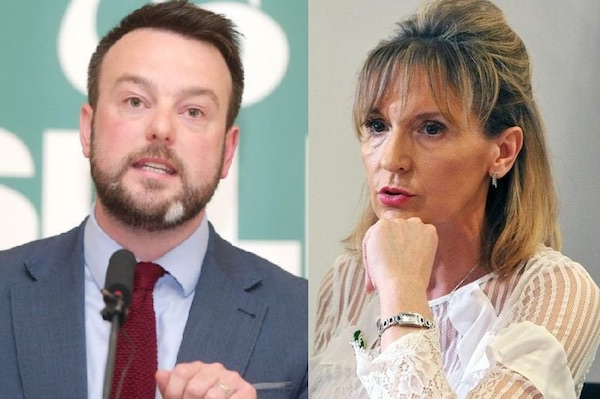
The election to the European Parliament in the North of Ireland on May 23 could be a historic one if two out of three seats are won by nationalists.
Speculation of a nationalist breakthrough follows the decision of Colum Eastwood (pictured, left), the leader of the SDLP, to contest for the third seat following the retirement of Ulster Unionist Party MEP Jim Nicholson.
The outgoing MEPs, Martina Anderson of Sinn Fein (pictured, right) and DUP MEP Diane Dodds, are considered certain to retain their seats, but the destination of the third seat is highly significant, and could mark a further change in unionist political control in the Six Counties.
The election will also feature another strong pro-EU candidate, Naomi Long of the Alliance Party, as well as possibly Jim Allister, leader of the extreme unionist Traditional Unionist Voice (TUV).
In 2014, the SDLP fell just short of the UUP total, as did the TUV. The SDLP’s Alex Attwood, who has since retired, only lost out on the eighth and final count in 2014, when Mr Allister’s transfers got Mr Nicholson over the line.
This year’s election, to be decided by Single Transferable Vote, may not even go ahead if a Brexit deal is concluded before election day, May 23.
Mr Eastwood said he was “seeking to secure a historic second seat representing the Pro-Europe Majority in Northern Ireland”.
“This is an election like no other,” Mr Eastwood said.
“In June 2016, a majority of people from communities across Northern Ireland came together to express our clear will that we should remain in the European Union. It was a vote that, unlike many others, saw people break free from their traditional trenches to occupy a common ground and a common identity.
“Since then, the broad progressive coalition that came together has been sidelined and silenced. Without a government in Belfast and with the DUP aligned to hard Brexit fanatics in London, people here have been ignored. Enough is enough.”
Mr Eastwood said the European election should be a referendum on Brexit, “the North’s People’s Vote”. He said the SDLP “is within striking distance of the third European seat”. He told BBC Radio Ulster his party was “best placed” to take a second anti-Brexit seat.
DUP leader Arlene Foster urged unionists to turn out and vote in the coming elections, warning that if Sinn Fein emerges on top, it will strengthen calls for a border poll.
“Some claim it does not matter which party you vote for, but you can be absolutely certain that it would be heralded as a massive success for republicans and a massive defeat for unionism if unionism was to be split and republicans were to have a massive win, and use the election results to strengthen their demand for a border poll,” she added.
Sitting Sinn Féin MEP Martina Anderson, who topped the poll in 2014 with more than 25 per cent of first preference votes, described the forthcoming election as an opportunity to send a message to Brussels, London and Dublin that the people of Ireland “will not be left behind”.
She said it was a poll the British government “didn’t want to happen”.
“The DUP didn’t want EU elections either – their Brexit involves stripping people of their rights including the right to vote,” the Sinn Féin representative said.
“Not only do they refuse rights that everyone else in Britain and Ireland enjoy, they also want to remove EU rights too.”
BATTLES ON LEFT AND RIGHT
In the 26 Counties, a total of 59 candidates have declared for the election, including three surprise candidates: prominent left-wing TDs Mick Wallace and Clare Daly, and right-wing populist Peter Casey.
Sinn Féin’s Lynn Boylan sitting MEP will face a battle to defend her seat in Dublin against Daly. Ms Daly’s colleague Mick Wallace also submitted his nomination papers for Ireland South, where Sinn Fein’s Presidential candidate Liadh Ni Riada will be looking to hold her seat.
In the vast constituency of Midlands-North West, which stretches from Donegal to Kildare, a variety of 17 candidates makes the result difficult to predict.
The sitting MEPs who are running again are Matt Carthy (SF), Luke ‘Ming’ Flanagan (Ind), and Mairéad McGuinness (FG). Fianna Fáil hopes to gain a seat here by running two TDs, but the dynamics of the contest have been changed by the surprise presidential runner-up, Peter Casey, who is running as an independent.
Setting out his reasons for running for election, Mr Casey said: “Rather than sitting on my hands for a year and waiting for a general [election], it made more sense to stand now. It is one of those things where I was damned if I did and damned if I didn’t. If I sat it out people would ask me what I have been doing.”
![[Irish Republican News]](https://republican-news.org/graphics/title_gifs/rn.gif)
![[Irish Republican News]](https://republican-news.org/graphics/title_gifs/harp.gif)

